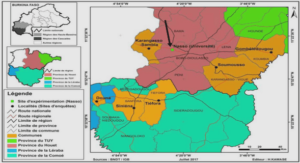IMMIGRATION AND THE PURSUIT OF THE AMERICAN DREAM
Discrimination, Low Paying, and Unskilled Jobs
Discrimination, like other negative factors analyzed in this study, is another concern that most immigrants in the USA experience. It can be considered as a time-honored practice 121 Paule Marshall, Brown Girl, Brownstones, op. cit., p. 103 90 which continues to be pervasive not only in the USA but throughout the world. In order to fight against this practice, some policies favouring equal employment opportunity have been established. Despite the efforts that have been made, this practice still continues to promote some people at the expense of others. Drawing upon our novels under study, it can be suggested that both Willa Cather and Paule Marshall have raised the issue with particular attention to some specific characters. Through their novels and information taken from previous literature, we realize that other issues such as low paying and unskilled jobs reflect discrimination. However, immigrants are always confronted with these problems which do not facilitate their search for materialism. From a historical perspective, discrimination in the United States was and still is commonly known as racial discrimination. Nevertheless, other types of discrimination exist and are particularly based on gender, religion, age, disability, national origin etc. With respect to our study on immigration literature, discrimination must be examined in a broader context to take into account all the experiences faced by immigrants in connection to it. According to the Collins COBUILD, “discrimination is the practice of treating one person or group of people less fairly or less well than other people or groups—unfair treatment of a person, racial group, minority etc.”In like manner, the Merriam Webster defines the term from a psychological approach as “the process by which two stimuli differing in some aspect are responded to differently”. Another important definition of discrimination is that given by the English Oxford Living Dictionaries. In the latter, the concept is defined in the following terms, “the unjust or prejudicial treatment of different categories of people, especially on the grounds of race, age, or sex”124. On the basis of the these definitions, one can argue that discrimination may have two different connotations that are: the positive connotation and the negative one. However, in connection with this study, the term discrimination must be studied by focusing on its negative connotation. Still, referring to the given definitions, we can find in our novels under study the prejudicial treatment of characters in different passages. To begin with, one can mention Marshall’s analysis which is more specifically based on racial discrimination. Throughout the novel, the reader discovers characters who are unable to find a good job because of the discrimination they face in a society where racism-related prejudices are still dominant. To illustrate, we may consider the following example in which Marshall describes the problem in these terms: Seifert’s hand might have penetrated Deighton’s shirt to rest hot and offensive on his flesh, for acute physical distaste gripped him. That touch recalled things thrust deep into forgottenness: those white English faces mottled red by the sun in the big stores in Bridgetown and himself as a young man, facing them in his first pair of long pants and coarse hair brushed flat, asking them for a job as a clerk—the incredulity, the disdain and indignation that flushed their faces as they said no.125 Marshall, through this statement, sheds light on the unfair and prejudicial treatment undergone by one of her characters. In this sense, Deighton condemns the attitudes of white employers toward him. Indeed, he is victim of racial discrimination and this is what prevents him from getting a job in his field of competence. Other characters are subjugated to the same situation which, too often, compels them to remain ignorant and innocent. Being under such a condition, immigrants feel helpless as it is observed in the case of Deighton’s friend, Seifert Yearwood. This character, through his words and behaviour, seems to be more aware of the discrimination they are confronted with. On the contrary, though Deighton is unfairly treated, he hopes to overcome this situation which is prevalent in the novel. His attitude reflects that of many immigrants in America; that is, because of the ideology of the American Dream, immigrants believe in their success despite the way they may be treated or the working conditions to which they may be exposed. Just like Marshall, Cather addresses the problem by focusing on gender discrimination which, unlike racial discrimination, is another type of discrimination favouring men over women. In My Antonia, for instance, the issue of gender discrimination is identified and even Antonia, the eponym character, has gone through this situation that is directly linked to gender stereotypes. Further, female workers occupy low paying and unskilled jobs whatever their competence. On the other hand, they may occupy high ranking positions related to their field of competence but this goes under the supervision of men who may give them little responsibility. Addressing the problem of low paying, Cather describes a scene in which Antonia’s elder brother, Ambrosch, deplores the attitude of Mrs. Harling, the employer, toward Antonia. For Ambrosch, Mrs. Harling wants to take advantage of her sister by paying her a low wage and seeming to keep the rest of the money for clothes and pocket-money: They had had a long argument with Ambrosch about Antonia’s allowance for clothes and pocket-money. It was his plan that every cent of his sister’s wages should be paid over to him each month, and he would provide her with such clothing as he thought necessary. When Mrs. Harling told him firmly that she 125 Paule Marshall, Brown Girl, Brownstones, op. cit., p. 39 92 would keep fifty dollars a year for Antonia’s own use, he declared they wanted to take his sister to town and dress her up and make a fool of her. Mrs. Harling gave us a lively account of Ambrosch behavior throughout the interview (…) putting on his cap as if he were through with the whole business (…) Mrs. Harling finally agreed to pay three dollars a week for Antonia’s services—good wages in those days—and to keep her in shoes.
THE VIRTUES OF IMMIGRATION AND THE ADVANTAGES OF THE AMERICAN DREAM
To understand and address the topic on the advantages of the American Dream, we should refer to many ideologies and values that are related to this concept. In this regard, thanks to its positive perception, the American Dream emerges with several concepts among which the spirit of hard work, the notion of competitiveness, and the attitude of hope. However, even though it is an ideology, it has advantages that are worthy noting since along with being a dream, it is a pull factor that requires self-discipline, self-reliance, and the freedom of the individual who wishes to achieve it. As quoted above, those notions are American values that have marked the history of the United States and also contributed to the development of the country in all spheres. That is in the same context that the American Dream draws the attention of many people around the world, who yearn for immigrating to the Promised Land where everybody can succeed. Indeed, since its discovery, America has been perceived as a country given by Providence, an ideology which is, in part, reinforced by the spirit of Puritanism. Thus, when we deal with the virtues of immigration—U.S. immigration in the context of this study, it is necessary to point out that the debate is associated with the American Dream, an ideology that embraces basics values. However, bearing in mind the spirit of competition and the attitude of hope which are, among other values, essential elements that reflect the American Dream, many immigrants manage to achieve their dream of material success. In this respect, former U.S. president Woodrow Wilson sustains that, “America lives in the heart of everyman everywhere who wishes to find a region where he will be free to work out his destiny as he chooses”152. With respect to his analysis, it can be said that, alongside the attitude of hope, the American Dream creates in everybody’s mind selfdetermination and optimism which are among its best central tenets. Like other ideologies that have helped shape America, the American Dream has shaped and continues to shape the thinking and behavior of U.S. citizens and immigrants as well. In another sense, thanks to it, people believe in their potential which will bring them success no matter the life they may endure. Self-confidence and self-discipline are, however, necessary to achieve one’s goals as it is suggested by most studies exploring the topic. For some critics, the American Dream is one of the driving forces of the U.S. economy, since immigrants, though considered a threat to the nation, bring considerable contributions to the economic development of the country. Others, in a similar manner, argue that, without immigrants, American prosperity would not be possible simply because America is a nation of immigrants 152 OSKAR, “America the Promised Land”, Delta Winds: A Magazine of Student Essays, A publication of San Joaquin Delta College 2008, America the Promised Land, in http://www.deltacollege.edu/org/deltawinds/DWOonline08/americathepromisedland.html. 17 Apr. 2018. 117 but also a place where immigrants are more likely to start little business than natives while hoping for the best. This latter approach reflects the idea that some immigrants are selfemployed and, as above noted, self-disciplined in order to achieve their goals. For example, in literary terms, Willa Cather’s O’ Pioneers! traces the notion of selfdiscipline through its protagonist Alexandra Bergson. The notion of self-discipline is, then, a virtue that immigrants acquire consciously or by embodying those who represent good examples of success. Marshall examines the concept by showing the determination of the Barbadian community where the members must comply with the decisions established or taken by the whole community in favor of their well-being and success. Also important when dealing with virtue is Plato’s examination of the concept. Through a philosophical approach, he defines the term by associating it with knowledge which helps us determine what is good and bad. Furthermore, his definition of virtue has also taken into consideration other notions such as wisdom, temperance, and courage that seem to be interesting in the lives of immigrants. Our purpose in mentioning Plato is to show how virtue is a necessary element in order to succeed one’s life. Regarding the theme of immigration, wisdom, temperance, and courage can be considered as being key values that must be possessed by immigrants. Courage, for instance, is an essential aspect in order to succeed abroad and we can, through our novels under study, find characters whose courage, reflecting hard work and determination, has helped to make headway. Also, courage here means steadfastness and hopefulness as is the case of Antonia who, regardless of her failure in Black Hawk, dares to return to the countryside to pursue her dream. Another essential notion that should be mentioned when addressing the issue on the pursuit of the American Dream is the cultivation of character. Similar to the aforementioned values, character is another quality that determines and measures our worth. However, it can be suggested that we need to cultivate our character so as to be respected by others and to occupy a central position into society. An approach to the same issue is made by writers such as Willa Cather and Paule Marshall who present scenes that reveal the maturation of characters who show their worth in their quest of materialism and better living conditions. To illustrate, let’s consider Selina who, though she is young knowing little about the purpose of their community, ends up understanding her mother’s daily struggles and her intention to own a brownstone house. Drawing upon the above analysis, one may contend that Silla has helped her daughter, Selina, to cultivate her character. In like manner, Cather, in O’Pioneers!, shows how 118 Alexandra’s father has contributed to making her an assertive woman even if her brothers disapprove the fact that she manages the family property. But despite their disapproval, Alexandra has learnt to cultivate her character and dignity which made her a successful and respected farmer in the Divide. To a certain extent, it seems to be important to note that immigrants in the USA are motivated by the philosophical ideology of the country in addition to other elements that make it a land of opportunity. The spirit of free enterprise is for example recognized as a key factor of the American democracy; in this regard, it helps both Americans and immigrants better devote themselves to pursuing their dreams. Regardless of this perspective, it is therefore important to understand the multiple dimensions of immigration. To this point, what we mean by the virtues of immigration and the advantages of the American Dream will be examined in terms of hard work and the tenets for achieving success that we will better examine in our third chapter; but also of considerable significance in this second part is to see how the American Dream has contributed to the shaping of the American spirit.
INTRODUCTION |





